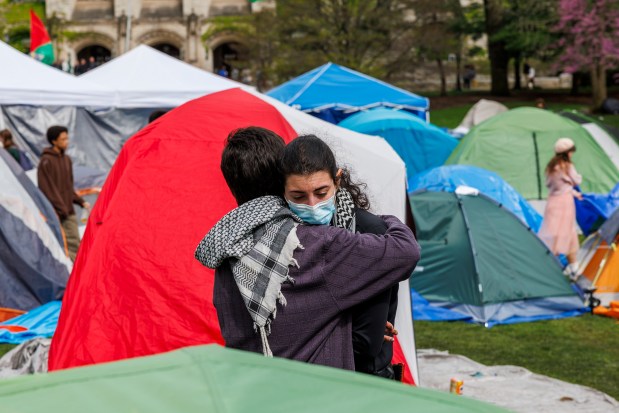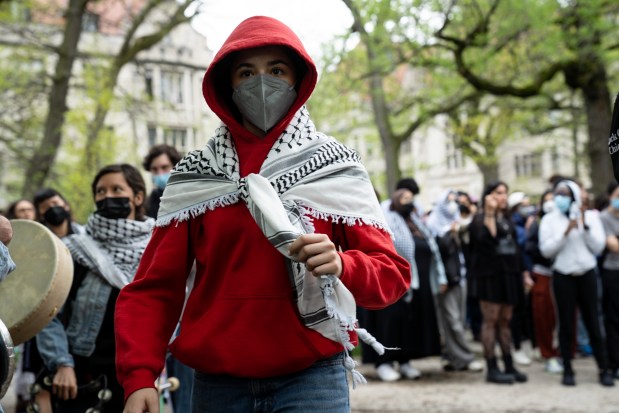Joining large-scale protests on university grounds across the country, students at the University of Chicago set up an encampment on Monday that they say they plan to occupy until administrators heed their concerns and divest from companies with ties to Israel, including weapons manufacturers supplying arms to Israel’s military.
After setting up more than a dozen tents in the Main Quadrangle on the Hyde Park campus, U. of C. protestors led an hour-long rally dissenting Israel’s bombardment of Gaza as the death toll in the besieged area climbs to more than 34,000 people since Oct. 7.
The rally, which also called on U. of C. to end partnerships with Israeli universities and commit to transparency, drew nearly 500 people erupting in chants.
U. of C. senior Youssef Hasweh, who is Palestinian, led the crowd in a run of “Paul, Paul what do you know? Where does all our money go?”
Students said the chant references university President Paul Alivatos’ refusal to meet with students on the school’s investments, which they’ve been demanding since last fall.
In a statement late Monday afternoon, Alivatos said the university will only intervene when and if the protests block the learning or expression of others or if the demonstrations “substantially disrupts the functioning or safety of the University.”
“I believe the protesters should also consider that an encampment, with all the etymological connections of the word to military origins, is a way of using force of a kind rather than reason to persuade others,” Alivatos said. “For a short period of time, however, the impact of a modest encampment does not differ so much from a conventional rally or march. Given the importance of the expressive rights of our students, we may allow an encampment to remain for a short time despite the obvious violations of policy—but those violating university policy should expect to face disciplinary consequences.”
In a follow-up statement, Michele Rasmussen, Dean of Students at U. of C., said setting up tents on the Quad or erecting other structures and obstructions without prior approval is a violation of University policy and will result in disciplinary action.
“We are monitoring the situation closely. The individuals involved are on notice that the University is prepared to take further action in the event of continued violations of our time, place, and manner policies governing protests, threats to public safety, disruption of operations or academic activities, or destruction of property,” Rasmussen said.
Hasweh said the encampment was designed to be “a university within a university” complete with a welcome tent, a library consisting of a tall shelf filled with books and tables with food and water. Inside the camp, several students worked in groups on laptops.
Student organizers chose to begin the demonstration two days early, Hasweh said, after a right-leaning media outlet on campus leaked their plans to occupy buildings for a peaceful sit-in.
Protest encampments have popped up in the past week at nearly two dozen college campuses across the country, including Harvard, Brown, the University of Michigan and the University of Texas at Austin. New York’s Columbia University became the epicenter of the large, and at times violent, movement in recent days, as demonstrators clashed with police and administrators announced classes on the main campus would be held remotely for the rest of the semester.
Last week, the Palestinian-led movement sparked protests at several Chicago universities and colleges, including at Northwestern University where an agreement between students and administration was reached Monday afternoon.

Northwestern University officials said in an email that the move allows demonstrations to continue on campus through June 1, but requires the immediate removal of tents and sound systems, as well as a commitment that all protesters will adhere to university policies.
Students at the School of the Art Institute of Chicago, Columbia College Chicago and Roosevelt University also marched on Friday in solidarity with Palestinians in Gaza.
School administrators nationwide are also cracking down on pro-Palestinian demonstrators with arrests and canceled classes. In an email, members of UChicago United for Palestine (UCUP), said the scale of the repression of students’ freedom of speech across the country is incomparable to the suffering of Palestinians in Gaza and across the occupied Palestinian territories.
The relationship between student activists at U of C and the university has been tense since November, when 26 students were arrested by campus police for refusing to leave the admissions building on campus during a sit-in. Charges for criminal trespassing were later dropped but the students still face disciplinary hearings, less than two months away from graduation.
Further sparking the pro-Palestinian movement on campus was a meeting between Alivatos and Yinam Cohen, the Consul General of Israel to the Midwest, in February. In a post on X, Cohen said the purpose of the meeting was “to further enhance the partnership between [the University of Chicago] and Israeli research institutions and to make sure that every Jewish or Israeli student feels safe on campus.”
Hasweh, who was one of the 26 students arrested in the fall, said he simply “wants to be noticed” by university administrators through the encampment.
“It’s insane to feel you’re invisible but know that you’re not,” he said, adding that U. of C. is choosing not to engage with pro-Palestinian students. “What power can you do with that? And that’s what we’re trying to figure out.”
In attendance at the encampment Monday was longtime Chicago revolutionary organizer Frank Chapman, who serves as the educational director and field secretary at the Chicago Alliance Against Racist and Political Repression.
Chapman, who began organizing in 1961, sat in a red chair at the center of the rally. He leaned in, focusing on the speeches made by student organizers, before one of them handed him the microphone.
“I’m tired but I ain’t tired of fighting,” Chapman said. “When it comes to the course of liberation in Palestine, I am representing the entire oppressed Black community.”




